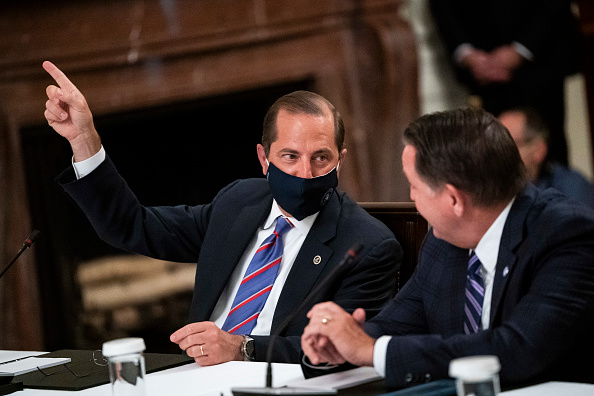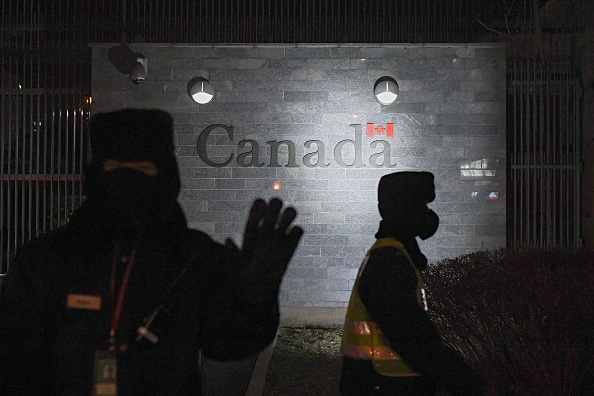
 Fraying Relations
Fraying RelationsThe Trump administration is moving forward with sanctions against officials in Hong Kong and mainland China involved in "undermining Hong Kong's autonomy," according to a Treasury Department statement today. The sanctions, which are being levied against 11 officials, including Hong Kong Chief Executive Carrie Lam, are the first round of sanctions following President Trump's executive order to punish China over its actions in Hong Kong.
Further intensifying relations will be the upcoming visit to Taiwan by U.S. Secretary of Health and Human Services Alex Azar, who will lead a trip to Taiwan to "strengthen economic and health cooperation" in the COVID-19 pandemic, marking the first ever visit by a U.S. HHS Secretary to the island. The trip, possibly the highest-level visit of a U.S. cabinet official since the United States switched diplomatic relations from the Republic of China to the People's Republic of China in 1979, comes amid a broader downward spiral between China and the United States and is expected to provoke anger from Beijing.
The two moves will likely add tension to the upcoming trade discussions between U.S. Trade Representative Robert Lighthizer and Chinese Vice Premier Liu He. The two are set to discuss the bilateral Phase One deal, including China's commitment to buy $200 billion in American goods over two years. With Beijing's energy purchases falling 95% below their expected levels, it remains to be seen whether China will meet its Phase One commitments. The Chinese side is also likely to raise concerns over the U.S. crackdown on Chinese technologies. For more on US-China economic diplomacy, read the latest commentary from Sara Hsu, Visiting Scholar at Fudan University and CEO of China Rising Capital Forecast.
 Digital Diplomacy
Digital DiplomacyPresident Trump signed two executive orders late on Thursday that would usher in restrictions on two popular Chinese apps, TikTok and WeChat. The orders will bar people in the U.S. from transactions with the apps starting when it comes into force in 45 days' time, citing national security as the reason for the new restrictions. It comes as Microsoft is in talks to buy the U.S. arm of TikTok from its current owner, ByteDance. In a press conference on Tuesday, President Trump said that a "substantial portion" of the acquisition cost be given to the U.S. Treasury, since the U.S. government was "making it possible" for Microsoft to buy the company. Unconfirmed reports on Thursday suggested that Microsoft could very well go a step further and attempt to buy all of TikTok's global operations. A spokesperson from Tiktok said that there was "no due process or adherence to the law" from the Trump administration; TikTok's sister app for the Chinese market, Douyin, would be unaffected by the sale. The future for WeChat in the United States looks more unclear: the social networking app is used by many overseas Chinese for communicating with family back home, and is used domestically as a news site, a digital wallet, an instant messaging app, and much more.
Possibly signaling even harsher restrictions, U.S. Secretary of State Mike Pompeo issued a statement on Wednesday calling for a "Clean Network" – a program that takes aim at "malign actors, such as the Chinese Communist Party." The program would remove Chinese phone manufacturers' abilities to pre-install apps from U.S. companies on their telephones and prevent Chinese apps, such as WeChat, from being downloaded in the U.S. It also seeks to shore up support from American allies against unwanted interference in technology, such as undersea cables, cloud-based storage and mobile phone networks. Wang Wenbin, the Chinese foreign ministry spokesperson described the plan as "absurd and laughable."
 Trials and Tribulations
Trials and TribulationsThe United States is not the only North American country in the midst of an increasingly tense relationship with China. Canada-China bilateral relations also continue to struggle, as China has now sentenced another Canadian citizen to death, the third Canadian to receive the penalty for drug-related charges since October 2016. Foreign Ministry Spokesperson Wang Wenbin stated that "China's judicial authorities handle cases involving criminals of different nationalities in accordance with law," signaling that this would not affect China-Canada relations at large, despite the souring of relations since the arrest of Huawei's Meng Wanzhou in 2018. "Canada opposes the use of the death penalty in all cases, everywhere," said Global Affairs Canada spokesman John Babcock.
Meanwhile, Canada's quest for a COVID-19 vaccine may be delayed further, as shipments of a drug for the human trials have been held up by Chinese customs for over 2.5 months, according to researchers involved with Canada's trial efforts. The reasons for the delay are unknown, although some experts believe it is likely a result of the souring relations between the two nations.
Prepared by China-US Focus editorial teams in Hong Kong and New York, this weekly newsletter offers you snap shots of latest trends and developments emerging from China every week, while adding a dose of historical perspective.
- 2020-08-01 Turning Tides
- 2020-07-24 Up in Smoke
- 2020-07-17 Status Stripped
- 2020-07-10 A Historic Moment
- 2020-07-03 Handover Tested
- 2020-06-27 Relationship Spiral
- 2020-06-20 Bolton Bombshell
- 2020-06-13 Fits and Starts
- 2020-06-06 Confluence of Crises
- 2020-05-29 Questions of Autonomy
- 2020-05-22 Pandemic Decisions
- 2020-05-16 Fractures and Fault Lines
- 2020-05-09 Attacks and Counterattacks
- 2020-05-02 Retaliatory Actions
- 2020-04-24 Sinking Perceptions
- 2020-04-18 Pandemic World
- 2020-04-11 The Long Road Back to Normalcy
- 2020-04-03 Shifting Gears
- 2020-03-28 Cooperation or Confrontation
- 2020-03-20 World in Turmoil
